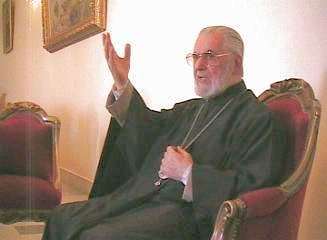Patriarch Ignatius Hazeem IV,
Patriarch of Antioch for the
Syrian Orthodox Church.
18-sep-03, morning
This morning we visit
the Patriarch of the Syrian Orthodox Church.
We sit at one end of a large and ornate reception hall.
The Patriarch speaks excellent English, he has been to
America "many times", but he speaks very softly.
He proves to be a very subtle thinker. As usual, coffee is served.
 The Patriarch:
America seems to be using force.
He says that the U.S. is "not necessarily like Nazi Germany" -- we
still have our freedoms.
He's sure that Americans don't really
perceive themselves as superhuman.
(A very elegant way of expressing criticism: 'I'm sure the U.S. isn't
really as evil as it seems...')
He wishes that we would "wage war not in superiority of
arms but in good deeds."
The Patriarch:
America seems to be using force.
He says that the U.S. is "not necessarily like Nazi Germany" -- we
still have our freedoms.
He's sure that Americans don't really
perceive themselves as superhuman.
(A very elegant way of expressing criticism: 'I'm sure the U.S. isn't
really as evil as it seems...')
He wishes that we would "wage war not in superiority of
arms but in good deeds."
Christians here know how to co-exist happily with Muslims.
The colonial period introduced some divisiveness. Syria is different
from Egypt; here we're free to co-exist.
Persian, Greek, and Islamic cultures all intersect here -- "we are a
place of meetings".
It is multicultural: "we don't need to be trained to conduct dialogue".
Jews didn't leave because of persecution.
[Although I have heard differently elsewhere. I haven't found any information
on this topic that I fully trust.]
Christians are free to observe the Sabbath, and shops usually have signs
"closed on Sunday" or "closed on Friday".
Christmas is a national holiday.
Churches get their gas and electricity for free, just like the mosques.
"We are being together; I don't even
call it a dialogue."
Everyone in Syria thinks that America is a Christian
country. Syria is not secular in the same way we are; every citizen is
identified as belonging to a religious community.
The Patriarch
recounts the time he met the U.S. Ambassador walking alone near the
church. The Patriarch asked "why are you walking alone?" The
ambassador answered "because I can't do this at home." This story
illustrates the safety here; there is virtually no violent crime.
Women can walk anywhere in Damascus any time of night and be safe.
The police are not even armed.
The Patriarch does say that "things could be better", particularly
citing the single-party system. But he is optimistic, and states
that "change in the area must come from Syria and Lebanon".
(He states that Syrians view Lebanon as a part of their country.
We'll hear this many times in Syria.)
"We are happy. Not very happy -- we can wish for better -- but
we are happy."
He talks more about relations between the Christian denominations.
He says that the churches have a "gentlemen's agreement" not to
call for unity -- that they prefer the diversity.
However, they are currently having problems with Protestant evangelicals
who seek to re-introduce divisiveness.
The Patriarch discusses the Palestine issue.
He regrets that Christianity seems to have no place in Israel/Palestine.
Christians and Muslims here all pay a price for the Palestine issue,
but Christians have no voice in resolving it.
Christians are oppressed in Israel. (He says that there is a limit
of 5,000 on the Christian population of Jerusalem. I find this hard
to believe but won't dismiss it.)
He states that Palestine is a political issue, not a religious one.
If it were a religious issue, Christianity would not be ignored, as
Jerusalem is as sacred to Christians as it is to Jews and Muslims.
"My religion", he says, "is very concrete." There is a very strong
historical sense here, a sense of being bound to place. He also
talks of "the oppression of hope."
This part of the world is very religious; God is mentioned in almost
every phrase here, by both Christians and Muslims: "God willing",
"thank god", etc.
|